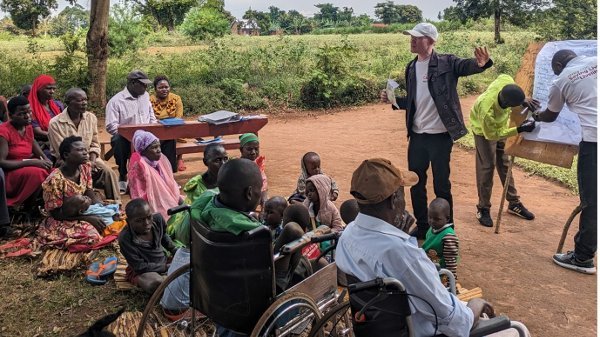Adapting Health Groups for People Living with Disabilities
In Uganda, one in ten people live with a disability. They will require access to health services for issues that can affect anyone in the community. This can include getting a routine vaccination or treatment for malaria.
The reality though is that inaccessible facilities, lack of transportation and high medical costs prevent people living with disabilities from getting the care they are entitled to.
Women and Children First, with our partners, is setting up community health groups to empower them to access the healthcare they need.
Issues include a lack of sign language fluency, which isolates those with hearing impairments. People with albinism cannot get vital injections, because of misguided beliefs their skin will not heal properly. Dwarfism is drastically misunderstood.
In Uganda, personal assistance is predominantly provided by close family members. There is a very young boy in the Bumaana village with cerebral palsy, whose sister, no older than six, has taken on demanding care duties whilst their parents’ work.
All this leaves behind the most vulnerable. Up to 57% have unmet healthcare needs that hinders their potential. For so many, their basic health rights are being denied.
Women and Children First know strong, connected communities have the power to make change happen.
Alongside our partners London School of Hygiene and Tropical Medicine, AMREF Health Africa and MRC Uganda, we have set up community groups in five communities to empower them to access the healthcare they are entitled to.
The groups identify and implement local solutions to the barriers that hold them back. This is the first time they have been used specifically to support women, men, and children with disabilities.
Turnout for these groups has been high. As well as those living with disabilities and their carers, people are attending because they want to learn more. As a result, the groups are starting to empower those who have too often been ignored.
The headteacher of Buwologoma School, who has a long-term physical impairment says, “We've always been excluded. Now, this is the first time we have a group focusing on us." Agreeing, the council chairperson of Bumaana believes, "It’s made us love each other more."
The groups are ambitious. They want to advocate for better training for healthcare workers to better understand their needs, and for improved infrastructure.
"They came up with practical solutions, such as creating a village loan scheme to pay for medical emergencies as lack of money is a huge barrier to people getting the care they need," explains Annemijn Sondaal, Programmes Manager.
"The community spirit is embedded in their group names. “Gema Kumwino" translates to "support one another". "Twisakilara" means "we agree as a team".
The groups plan to rally the wider community to garner support in implementing these ideas.
From 2024 to 2026, we will run a larger trial to assess the impact this participatory approach can have on people living with disabilities.
Annemijn Sondaal adds, “Testing response, engagement and action by the groups is vital to understanding if they are meeting a community's needs.
“This is similar approach to how we test other new work, such as our use of radio programming with groups, to help adolescent girls improve their sexual and reproductive health in Malawi. If successful, they have the potential to be scaled up.”
This work in rural, remote communities, improving people’s lives and health, would not be possible without our wonderful supporters. Thank you.
This project and accompanying study is funded by the NIHR Global Research Professorship scheme. The views expressed are those of the author(s) and not necessarily those of the NIHR or the Department of Health and Social Care.

